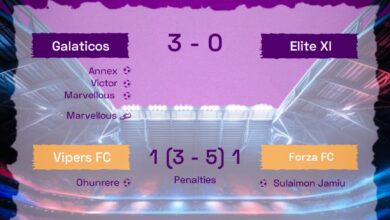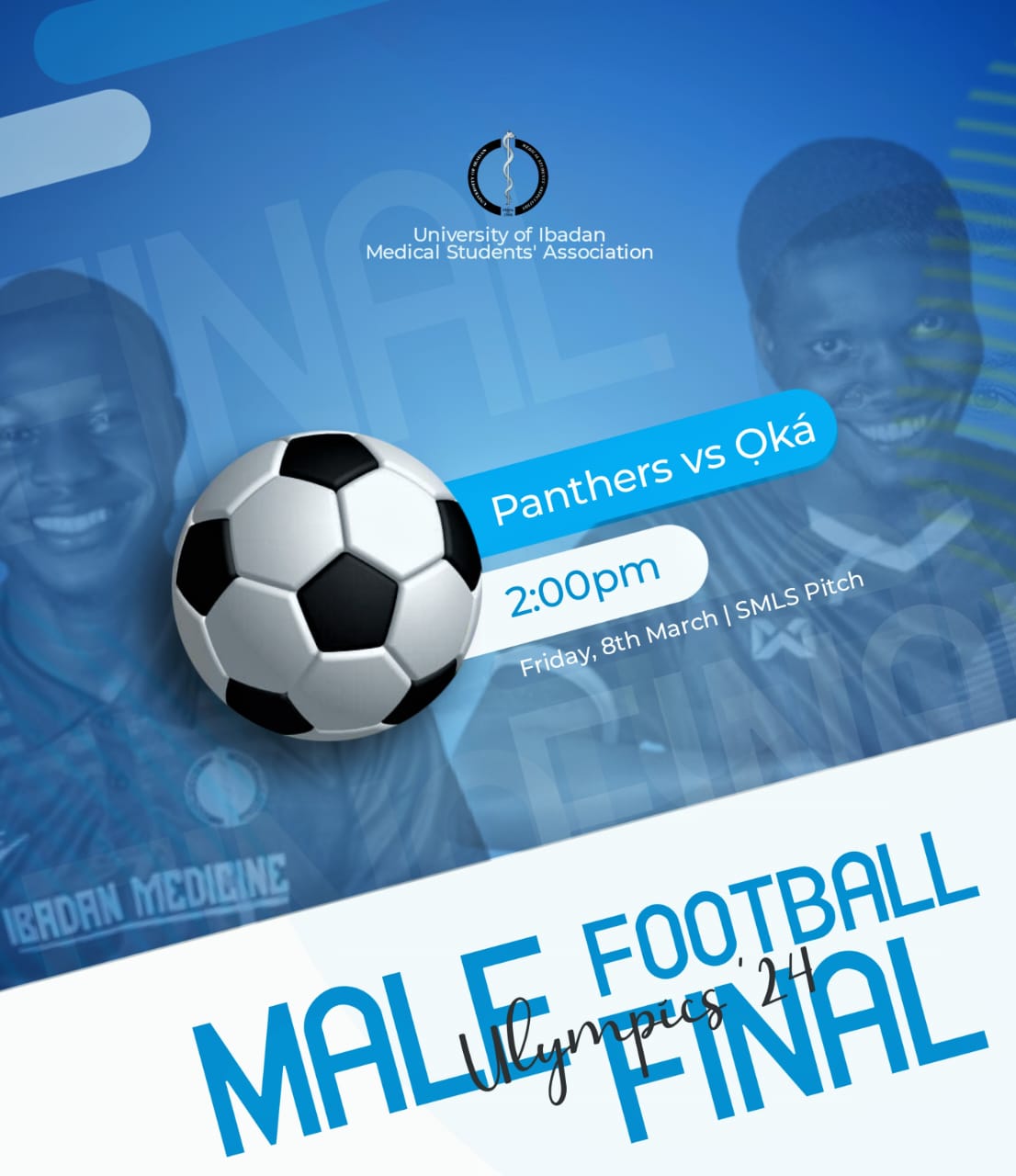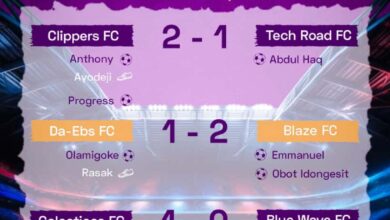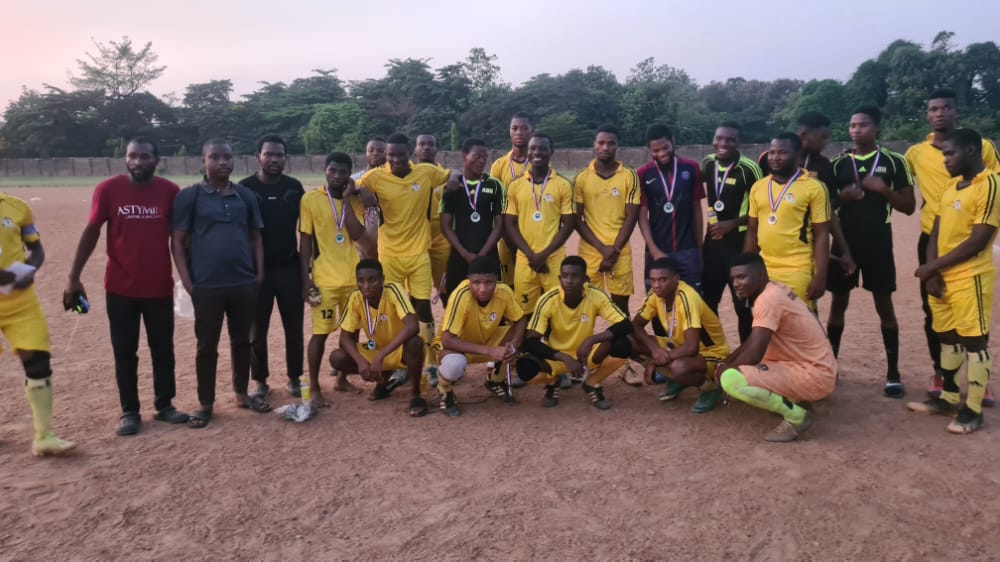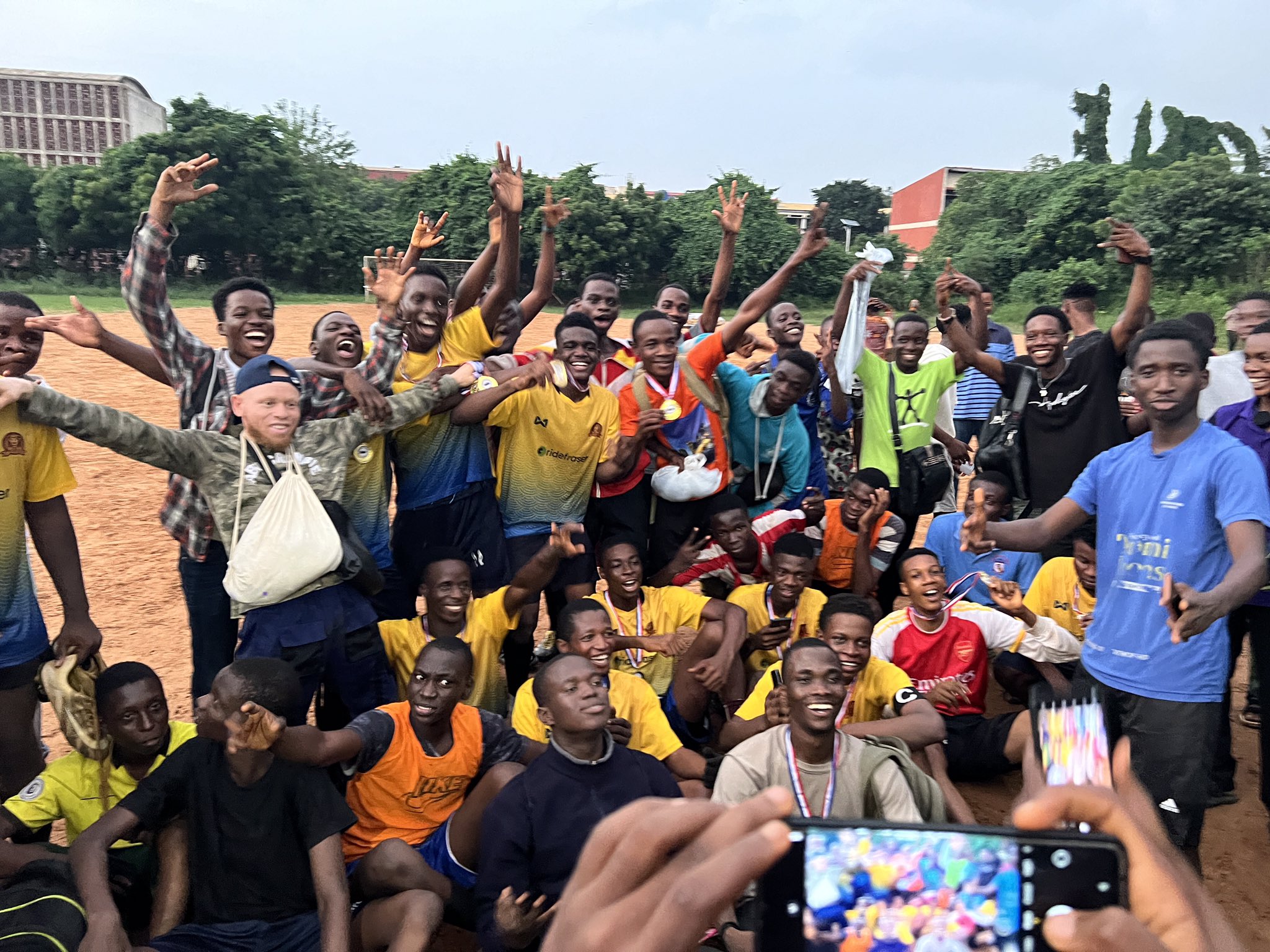The Rise of Hall Football Leagues in UI
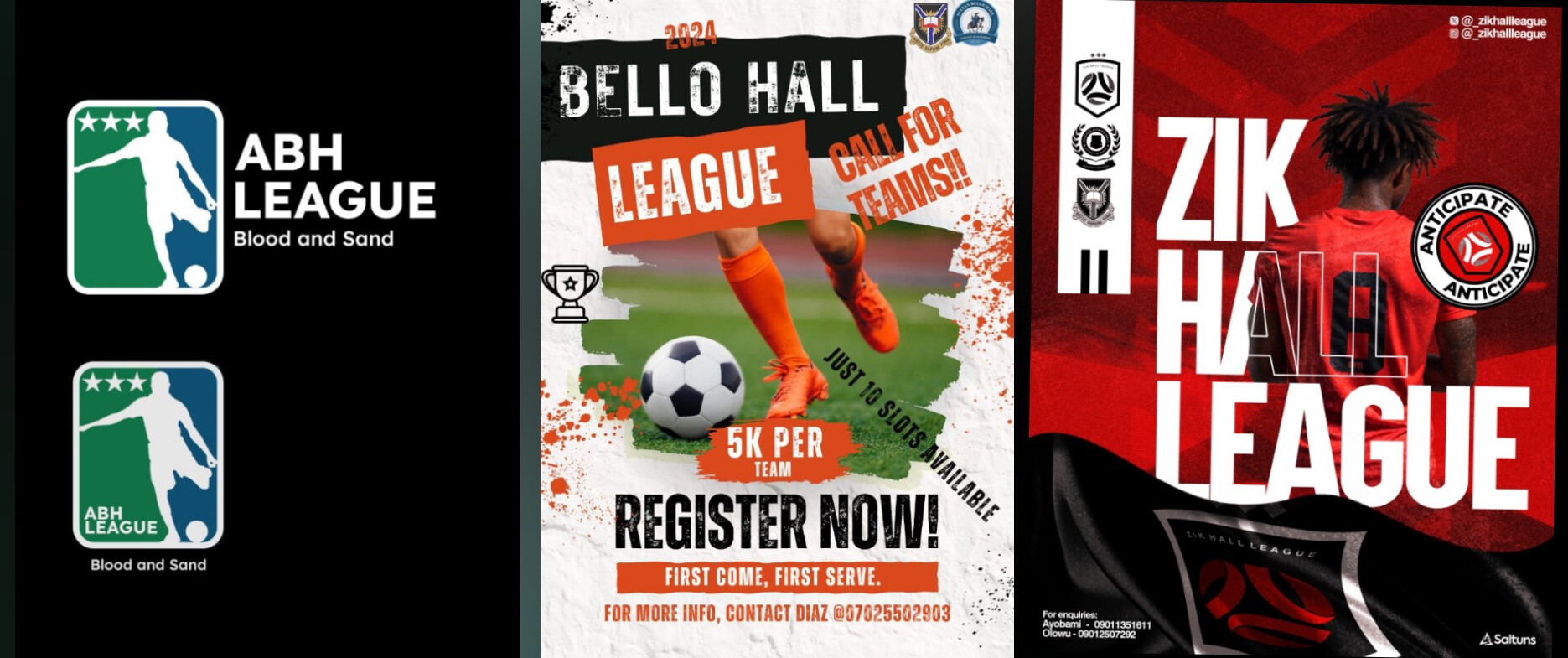
There’s been a significant improvement in the sports culture at the University of Ibadan in recent years. A culture that has now grown beyond an avenue for recreation into a community of talented enthusiastic individuals doing incredibly well outside the walls of a lecture theatre. Football, particularly, has become a sport one can actively stay involved in throughout a session courtesy of competitions organised by private organisations and the Student Union.
Within departments, inter-class competitions (often time the Head Of Department Cup) are pronounced in the second half of sessions; the same goes for inter-departmental competitions organised to claim the Dean’s Cup. The UI’ SU Super Cup gives the Dean’s Cup winners in every faculty a chance to battle for further gold, making it more like a ‘Champion of UI’ trophy. SEALS Cup, quite similar to the Super Cup, is another inter-departmental competition that gives every registered department a chance to shoot for football gold, some double – in cases where they can register their male and female teams. At the faculty level, we have the UI’ SU-organised biennial Interfaculty competition that’s more inclusive with other sporting activities, giving every department in a faculty the chance to form a formidable team to challenge for medals.
Again at the Student Union level, we have Inter-hall competitions where fraternity is not by discipline but by hall of residences. Within halls of residences, inter-floor and inter-block competitions are a part of the culture earnestly upheld by Sports Ministers/Directors. We also have level-specific competitions like the CBN Cup for freshmen offering courses in the popular Faculty of Science lecture theatre and the Survival Cup for sophomores. On the other side of the divide, UCH, the Provost Cup brings together all the departments under the College of Medicine. Private organisations like Sigma Club also uphold the culture with the Sigma Chief’s League organised every session. In all this, friendly matches remain a surviving art at the University of Ibadan.
These competitions but one employ a knockout style where fates are almost always decided in 60 minutes of football. The exception is hall football leagues. Of the 8 halls that play male inter-hall football in UI, only 3 halls of residence (Alexander Brown, Nnamdi Azikiwe, and Sultan Bello) have football leagues, with only one having existed for over twenty-five years. These leagues involve levels of tenacity, discipline, finance, rigour, and consistency, that regular competitions don’t quite demand. That’s aside from the groundwork and herculean planning that goes into making such a bold move. Hall leagues have been under-explored over the years and the rise in recent sessions bodes well for the sports culture in the University of Ibadan.
The requirements for proper maintenance are an interesting conversation starter. It’s quite difficult to pin the pioneer year, however, it is well established that the Alexander Brown Hall (ABH) League has existed since before the 21st century. In a conversation with the Press, Mark Obeya, a two-time (2022 and 2023) ABH League FA Chairman, confirmed that “there’s been some incomplete seasons or years of no league in between, but it’s been existing for that long”. He’s particularly aware of the incomplete season in 2019/2020 due to COVID-19 and the inconclusive season in 2021 because of a pause in physical activities in the hall (due to an alleged new wave of COVID-19 infections). Conversations with senior colleagues who finished medical school in the 2010s also revealed some breaks in that decade.

Looking into how much work goes into establishing a hall league, especially in an academic environment, Ayobami Ojeniyi, Nnamdi Azikiwe Hall’s current Sports Minister, said ideation came from the need for increased participation in sports within the hall at a time when the decline was apparent due to the graduation of a crop of sports stars. Seeing how long the ABH League had existed, Ayobami took the initiative to reach out to Mark Obeya with ideas and plans to make the fruition seamless. Like in Zik, Sultan Bello Hall League’s FA chairman, Quadri Adekele, said the idea was the Sports Minister’s, Francis Amadi, popularly known as Diaz. For an idea that involves the purchase of gear, and remuneration, among others, one cannot talk about planning without finances. Ayobami admitted that funding was indeed a big challenge. ‘When I wrote the budget mid last year, everything amounted to about a million naira. Teams (10) were to pay 10,000 Naira for registration; that, cumulatively, is just 10% of the total budget. I wrote proposals to a lot of brands, and followed up to the best of my ability but unfortunately none responded.’ This scenario shows how tough student organizers have it with fundraising for events and innovations while still keeping up with school work. We’ve seen student leaders opt for public crowdfunding on social media, with personal and professional accounts just to get visibility. After Ayobami’s initial option fell through, he went through the hall’s alumni body to get funds. He projected that getting about twenty alumni to donate 50,000 Naira each would solve the problem. He got positive responses, some notably giving more than expected. He also got financial help from some of his friends while others sponsored a few things like welfare for the medical team.
Similar to Zik’s story, Diaz didn’t get a major sponsor for financial assistance. Registration fee of 5,000 Naira from 10 teams, financial support from close friends, personal money, and support in kind from store/shop owners within the hall have done a great job maintaining the league. He said, “There are not really any major sponsors but people have helped in clearing certain expenses like GSK helping us get a ball sometime ago and Soccer Outfit giving us a discount on balls.” TheABH League FA, on the other hand, having built a rich alumni base, reaches out to the faction of alumni interested in sports. “We reach out to those who are interested in sports, especially whom have participated in the league before – either as players or as fans. We also reach some Senior Registrars and Consultants within UCH who are alumni of UCH. Most times we don’t get these funds till we’re way into the league.”, says Olamide ‘Liam’ Omotunde, current ABH League FA chairman. Just like Zik and Bello, ABH League uses the registration fees to kickstart a fresh season and then increases media coverage to get people talking and interested to either follow or assist in its running.
With the insane work ethic put into planning and organisation, it follows that people get to see the beautiful work through PR and media publicity. First, it is a testament to the significant improvement in the sports culture in UI. Second, it’s a win-win situation where people get entertained and there are sponsorship opportunities from interested individuals and organisations. Third, it’s a form of documentation for archival purposes and history writing. Fourth, it enhances the sense of community between students and the alumni body of these halls. Zik Hall League impressively has two social media accounts (X and Instagram) running in its first season, with its content improving every matchday. ABH League FA also manages an X and Instagram account, both being 2 years old (started in 2022 during Obeya’s first year as the FA chairman). Bello League is currently just on X, dutifully putting out important news and updates regarding the players and teams. These leagues have banter group chats where players and fans throw playful, light-hearted banter at each other. Its essence is very palpable especially in a university community where group chats create bonds, some chaotic, some entertaining, all necessary. ABH in context, Obeya said ‘It’s very key to the league in a number of ways. It has ensured that alumni from as far back as 2k13 stay in touch with the league by helping them see the progress made — in publicity, prizes and awards, and general standards. It also keeps the sentimental value they have with regard to the league alive. Overall, this helps with sponsorship and was also crucial to even the recent legends game. In addition, it helps to keep the league hype high for the participating players, coaches and fans.’ If you go on X and search ‘ABHleague’ with a hashtag, you will find tweets from as early as 2012 talking about the league. That gives perspective to how much social media helps document events, and how it keeps the culture alive. Daniel Olowu, Zik Hall League’s FA chairman, on the essence of banter groups, mentioned “the creation of a proper footballing community, revival of interests on the side of students that are privy to the league’s existence, etc”. On Public Relations and publicity, Olowu affirms that “your brand is as good as the number of people it gets to. This platform helps people keep in touch with the community even when they are not physically around”. Such is seen in the case of Bluelock FC in the Zik Hall League, owned by Ifeoluwa Farayola, a recent graduate of the Obafemi Awolowo University, Ile-Ife. For Liam’s administration, circulating info on ABH League to the farthest ends through PR, focused on three avenues (asides the social media accounts); the ABH football group, the Alexander Brown Hall itself, and the UI community in totality.

You can’t take away passion, love, commitment, heightened emotions, banter, and many more from the game of sports. Same way you can’t take away discipline. An integral part of football competitions in UI is the rulebook which guides conduct, pre and post-competition, and countlessly, we’ve seen how this solves issues that arise. Whatever help they offer knockout tournaments, they offer way more to hall leagues that undoubtedly span over a longer period. Each of these hall leagues is guided by a thorough, well-written rulebook the FA follows throughout the tournament. There are sets of rules that address the identity of players who can be registered and players who can be on the field at any point during a match. For context, it’s stated in the ABH League rulebook that a team cannot register more than 5 non-Brownites out of 11. Zik’s states a maximum of 6 non-Zikites out of 12 players. As much as flexibility is allowed in registration per identity, it’s noteworthy that there’s a boundary. Its essence is clear; that there’s optimal representation from the host hall in the league. Disciplinary actions are another section often visited during the league, with fines attached to defaulting any of the rules stated. Tying this back to finances, these fines contribute, in their little way, to how the FA manage expenses. Notably, in the ABH League, there have been cases of the FA issuing statements addressing indiscipline on the part of individuals or as a team. This keeps the community in check, even as they exhibit sportsmanship and different levels of emotional management.
For players, coaches – and even the team’s managerial circle – hall leagues have become an avenue for skill improvement. It’s evident in the crop of students people watch out for in tournaments like SEALS Cup, Super Cup, Dean’s Cups, Interfaculty competitions, etc. The pipeline extends to representation outside the university in Inter-Varsity Games, and even the possibility of professional football in European countries and beyond. Aside from improvement in skill, it’s another avenue for clarity and discovery of strengths. Some students discover a position they play better in, some discover a shot at managing a team efficiently. Some discover their scouting ability properly while others gain experience with the business part of managing a team/club. Speaking with the Press, 4th-year medical student Gerald Olokungbemi, who plays for Titans FC in the ABH League, said “The quality of players the league attracts is very high, so I get to play against some of the very best.’ Elkanah ‘Pogba’ Ayuba, a Ph. D. student playing for Los Galaticos in Zik Hall League, said the game has improved him in terms of stamina and agility. “The pitches are small and in such games there’s no room for rest, you have to keep going, swift movements and to play at such intensity requires lots of stamina.’ Emmanuel Abang, a third-year medical student, shares the same opinion with Pogba. For him, ‘As an amateur player, playing in these leagues with other kinds of players; other amateur and semi-pro players helped build my endurance, confidence and experience.’ As a player in all three leagues, Abang has shared the pitch with several other players in UI.
When asked how he manages to show up for games, seeing as one of the three leagues is not on UI main campus, he said “It didn’t happen often but when the timing of each match didn’t clash, I would play all 3 that Saturday and rest on Sunday. On some other Gameweeks, it’s possible I play Saturday and Sunday.’ Boluwatife Babalola, a graduate of the Department of Statistics who played for Gladiators FC (league winners) in the just concluded 2024 ABH League season and currently plays for table-toppers The Invincibles in Zik Hall League, admitted that “These leagues have helped me understand how important unity is to football. As we had to attack together and defend together.’ As it is typical of leagues to feature the transfer of players when windows are open, Oluwapelumi ‘Stan’ Adetifa, a 3rd-year Physiotherapy student, had the opportunity to play for Oshin FC in the first half of the 2024 ABH League season and Titans FC in the second half. In a chat with him, he said, ‘It wasn’t easy because I had to adapt to different roles in the two teams. I played out of position in one of the teams but still had to do what the coach wanted.” Stan moved to his current club because he didn’t play as much as he wanted in the former. John Adedoja, a 3rd-year Biochemistry student in Kenneth Mellanby Hall who plays for Para Boys FC in the Bello League, admitted the competitiveness in the league, having played with and against bigger and stronger guys.
It’s been quite some experience for managers of the teams in these leagues. Olajire Salako, a 4th-year medical student who coached Titans FC in the just concluded 2024 ABH League season, shared his two cents on being the manager. He remembered taking charge of the team – just after the second game of the season – and being fully aware that it was a rebuilding phase, following the exit of the big dawgs the previous season. In his words, ‘We’re building from scratch. It takes time. We knew this from the start and we did it to get fully familiar with the league as against upcoming seasons.’ Jire admitted that experience, inadequate substitutions per game, and the absence of a striker for the first half of the season were challenges. Titans finished 5th out of 6 in this just concluded season and 5th out of 7 in the one before that, and they hope to fizzle out the rough patch in subsequent seasons. Marvellous Oduola, a 400-level Chemistry student and coach of current 2nd-placed Los Pistoleros in Zik Hall League describes the coaching experience as a new but good and exciting one. ‘The players are friends of mine so my relationship with them is excellent, same with the club owner,’ he added. A club owner, James ‘Semaj’ Ajayi, a 4th-year Agricultural and Environmental Engineering student and co-owner of Emergence FC in Zik Hall League, weighed in on the financial and emotional aspect of such responsibility. “For the financial aspect, the club is doing her best to make sure that our team members are properly taken care of. For me as a co-owner, I haven’t looked into the business part of it as the league is still developing but I am very sure that my co-owner has plans towards making sure the team becomes a profitable venture”, he shared. On Emergence FC’s current position (4th) on the league table, Semaj described the journey as a rollercoaster. He also added that ‘the management has made sure not to make rash decisions and we’ve given the coach, players and other members of the team enough time to adapt to our style and they’re doing exceptionally well’.

On the maintenance of the culture and avoidance of decline, the importance of constant improvements and innovation cannot be overstated. This is seen in the new features introduced in every season of the ABH League. Particularly in the 2024 season, Liam ensured the continuity of the ABH female mini-league – started by Obeya – and successfully organised its second season, adding cash prizes. The cash prize for Dr Victor Aire’s FA Cup was increased. The ABH FA introduced a website that displays real-time updates much like in European football. There were issues with sustainability, excusable seeing that it’s a fresh idea that can be properly worked on. They also organised a novelty match between legends of the leagues: some doctors, others doctors in a bit. It was an old cats (pre-COVID legends) vs new cats (post-COVID legends) game with long-lasting memories made. Doctor Tobi ‘Leget’ Tunde-Alao, a former ABH FA chairman, thinks sustainability is owed to ‘the passionate desire to keep the culture alive. At least the desire of the people in charge of the league. People just want to make sure that the league lives just like the hall week and co.’ Zik and Bello, in their inaugural seasons, have plans to ensure longevity like incorporation of ideas into the hall’s constitution such that an ad-hoc committee oversees its operations every session. Doctor Tobi, having spent his preclinical years in Nnamdi Azikiwe Hall, was pleased to hear that there’s a Zik Hall League now. This speaks to the importance of this growing culture and its essence in the university community.
In conclusion, a not-so-visible aspect to the general public is the sacrifices made by members of the FA in these leagues. It’s unpaid work and the passion for such a brilliant idea keeps them going. It’s no small feat to ensure consistency throughout a full league season, regardless of the minor hiccups that surface during the course. The halls of residence also play a crucial role in maintaining the culture by providing support in the best way possible. In the ABH League, the hall makes a financial contribution to the league every year. There’s no doubt that hall leagues fuel a sense of brotherhood amongst students despite requiring a certain level of emotional attachment on the side. Research showed that these ideas existed once in some halls (particularly in Zik), but they didn’t cross the ideation-implementation or continuation hurdle. These leagues rank top of a list of what gives students a sense of home in the university and an avenue to showcase footballing abilities in weeks as opposed to the knockout styles in cup competitions. There’s the chance to make it right after a mistake, to finish better, to get your revenge against an opponent, to make a signing, and the chance to trade players, some of whom are not available in knockouts. The sense of community is ever-influential in the existence of these leagues. The energy is also contagious as we expect to see the rise of more hall leagues, including some in the female halls of residence.
Peter Adeyemo.
